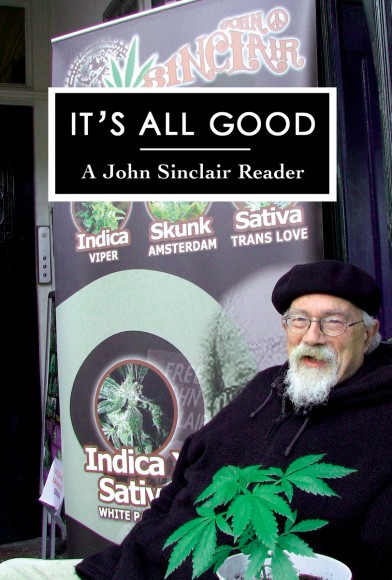The pioneering music journalist, poet and activist John Sinclair had already accomplished the work of a lifetime when he came to live in New Orleans in the early 1990s. During his time in New Orleans Sinclair left an indelible impression on the city though his work as a journalist, historian, poet, performance artist and radio host.
 Sinclair’s stint as a DJ on WWOZ helped codify what we know of the history of the Mardi Gras Indians. Many of the Indian gang members listened to and studied his broadcasts to help understand their own tradition. Sinclair wrote inspired stories of blues and jazz heroes who were still contemporary in various local publications, including OffBeat. As a poet and storytelling bard, Sinclair employed various groups of local musicians in what he called the Blues Scholars to improvise music behind his elaborate tales about the legends and myths of blues and jazz greats from the past, from John Coltrane to Big Chief Bo Dollis, from Robert Johnson to R.L. Burnside.
Sinclair’s stint as a DJ on WWOZ helped codify what we know of the history of the Mardi Gras Indians. Many of the Indian gang members listened to and studied his broadcasts to help understand their own tradition. Sinclair wrote inspired stories of blues and jazz heroes who were still contemporary in various local publications, including OffBeat. As a poet and storytelling bard, Sinclair employed various groups of local musicians in what he called the Blues Scholars to improvise music behind his elaborate tales about the legends and myths of blues and jazz greats from the past, from John Coltrane to Big Chief Bo Dollis, from Robert Johnson to R.L. Burnside.
A representative cross-section of Sinclair’s writings covering 50 years is included in his latest book, It’s All Good: A John Sinclair Reader. New Orleans music aficionados will find the two pieces on Dr. John included here to be essential history; likewise his pieces on Walter “Wolfman” Washington and Irma Thomas are important profiles of these New Orleans icons. But the book also contains fascinating reading about Sinclair’s attempts to form an arts collective in Detroit during the 1960s, as well as his writings as the leader of the White Panther Party and his crusade for the legalization of marijuana. Sinclair was arrested for giving two joints to an undercover police officer in the late ’60s. He was sentenced to 10 years in prison and released only after a benefit concert in support of his release was held in Detroit. The concert featured performances by Stevie Wonder and John Lennon, who wrote the song “John Sinclair” in support of his release.
The itinerant Sinclair now spends his time traveling, mostly between New Orleans, Detroit and Amsterdam. His bohemian lifestyle is poignantly described in one of the poems from this collection, “everything happens to me”: “a man without a country & a post office box in New Orleans for a permanent address, a pre-pay vodaphone & a laptop computer, one suitcase stuffed with clothing & a bag full of manuscripts & hand-burnt CDs—to keep my head straight & my heart right to keep up my travels & carry on the struggle into another new year, taking my little verses & a great big world outlook everywhere people will have me.”




